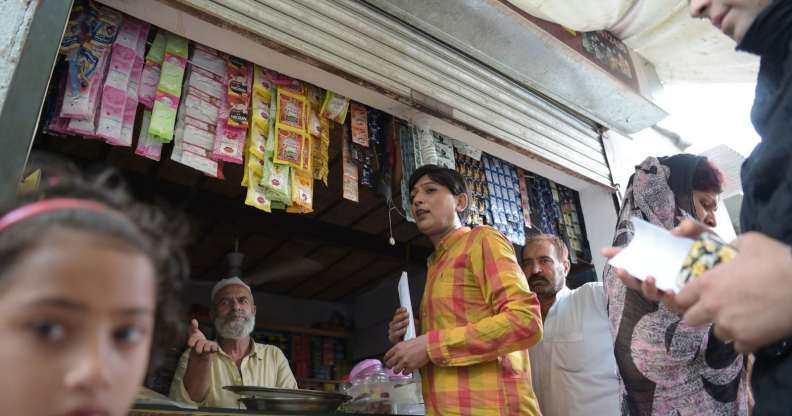Transgender people ‘barred from voting’ in Pakistan election

In this picture taken on July 3, 2018, Pakistani transgender independent candidate Nadeem Kashish (C), who will contest in the general election for a parliamentary seat, distributes pamphlets on the campaign trail in her constitutency in Islamabad. – “Give me a chance,” Nadeem Kashish pleads with voters in Islamabad. Her struggle is not for power — she knows her campaign is futile — but for acceptance, as transgenders make historic bids in the upcoming Pakistan election. (Photo by AAMIR QURESHI / AFP) / To go with PAKISTAN-ELECTION-TRANSGENDER-SOCIAL,PHOTOESSAY’ by Sajjad TARAKZAI (Photo credit should read AAMIR QURESHI/AFP/Getty Images)
Transgender voters in the Pakistani city of Peshawar have reportedly been denied access to polling stations during the country’s general election.
According to local media, dozens of people in the Khyber Pakhtunkhwa region have been barred from casting their vote because their identification cards did not match their gender identity.
Some trans voters who had updated their ID – including to the gender X category – were also prevented from casting their vote.
Pakistan issued its first passports with a separate gender X category last year, which allows trans citizens to self-identify with a third option instead of just male or female.
The president of the transgender advocacy group Trans Action Pakistan, Farzana Jan, was the first person issued a gender X passport.

A transgender activist in Pakistan (ASIF HASSAN/AFP/Getty)
“After a long struggle we are able to make another change. Now the the Government of Pakistan is issuing passports to transgender community as separate category,” they wrote on Facebook.
“Farzana Jan President of the TransAction alliance has become the first transgender person in KP and Pakistan whose passport carries a transgender identity. Thank you Govt of Pakistan, Ministry of Interior and passport authorities for listening to us.”
Five transgender women ran in Pakistan’s general election this week, which is the highest ever number of trans nominees in the conservative country.
Former cricket star Imran Khan looks set to become Pakistan’s prime minister, early results suggest.
Trans women Nayyab Ali, Nadeem Kashish, Lubna Lal, Alamgir (aka Maria) and Zahid Khan (aka Resham) all took part in the vote.
Three of the candidates reportedly ran for seats in the National Assembly and two contested seats in provincial legislatures.
In May, Pakistan introduced historic legislation protecting trans people from discrimination in employment, healthcare, housing and on public transport.

Pakistani election officials count ballots papers after polls closed at a polling station in Karachi (RIZWAN TABASSUM/AFP/Getty)
Dr Qasim Iqbal, executive director of NAZ, Pakistan’s leading organisation working for the health and human rights of sexual and gender minorities, told the Human Rights Campaign: “The law signals a recognition on the part of the Government of Pakistan that transgender persons are our sisters, brothers, friends, and that they have to be treated like every other Pakistani.
“The law, which is a result of the hard work, sweat, tears and blood of trans activists at NAZ and from across the country, makes Pakistan one of the most progressive countries in the world in terms of transgender rights.”
Despite this, violence and discrimination towards trans people in the country remains common.
Alamgir (aka) Maria, who stood as an independent candidate, told the BBC that hate crimes, or so-called honour killings, pose a huge risk to the transgender community.
“Our own family hires people to murder us,” she said. “I barely survived an assassination attempt when shots were fired at my house in Mansehra. There are still bullet holes all over my front door.”

